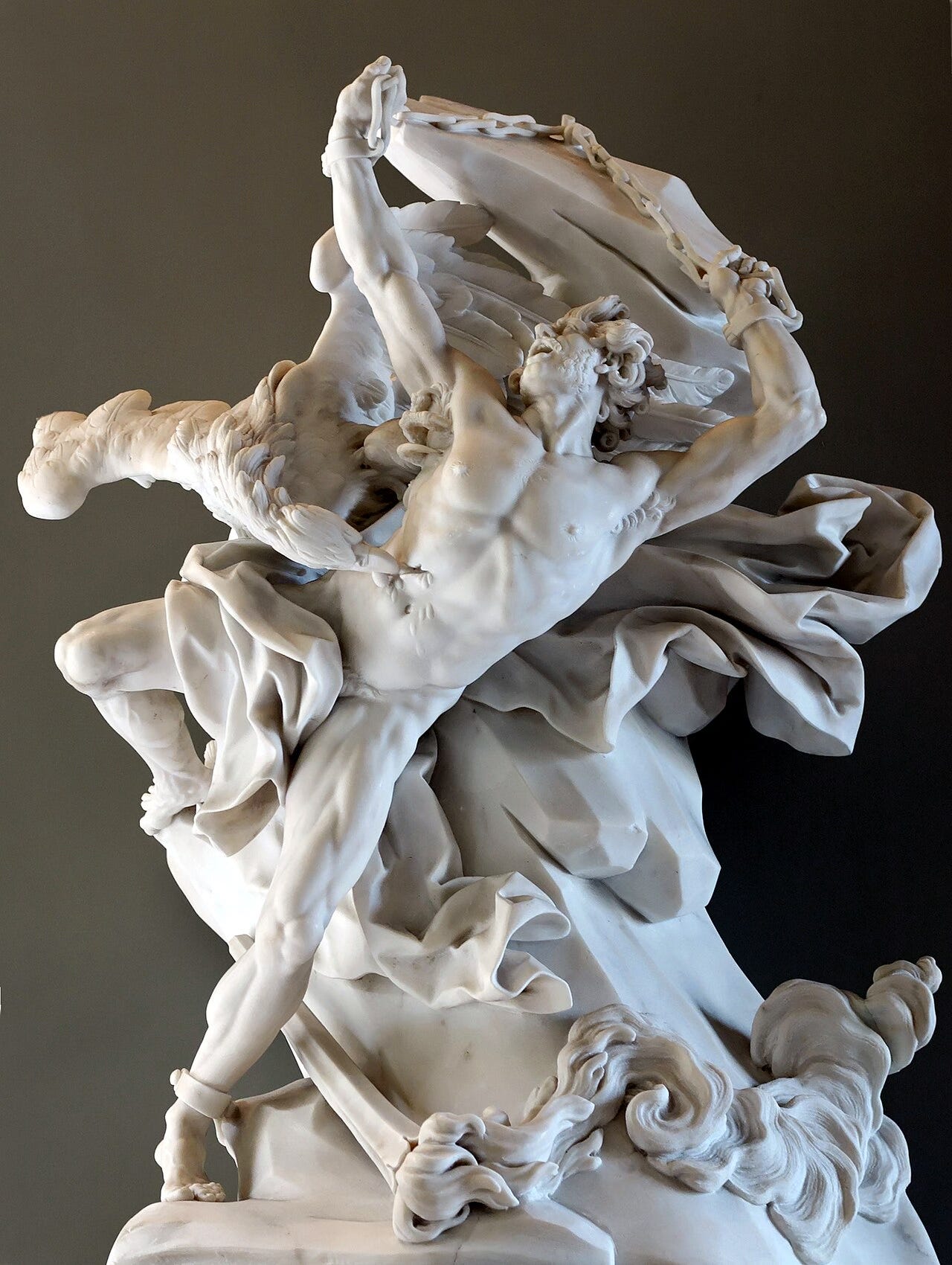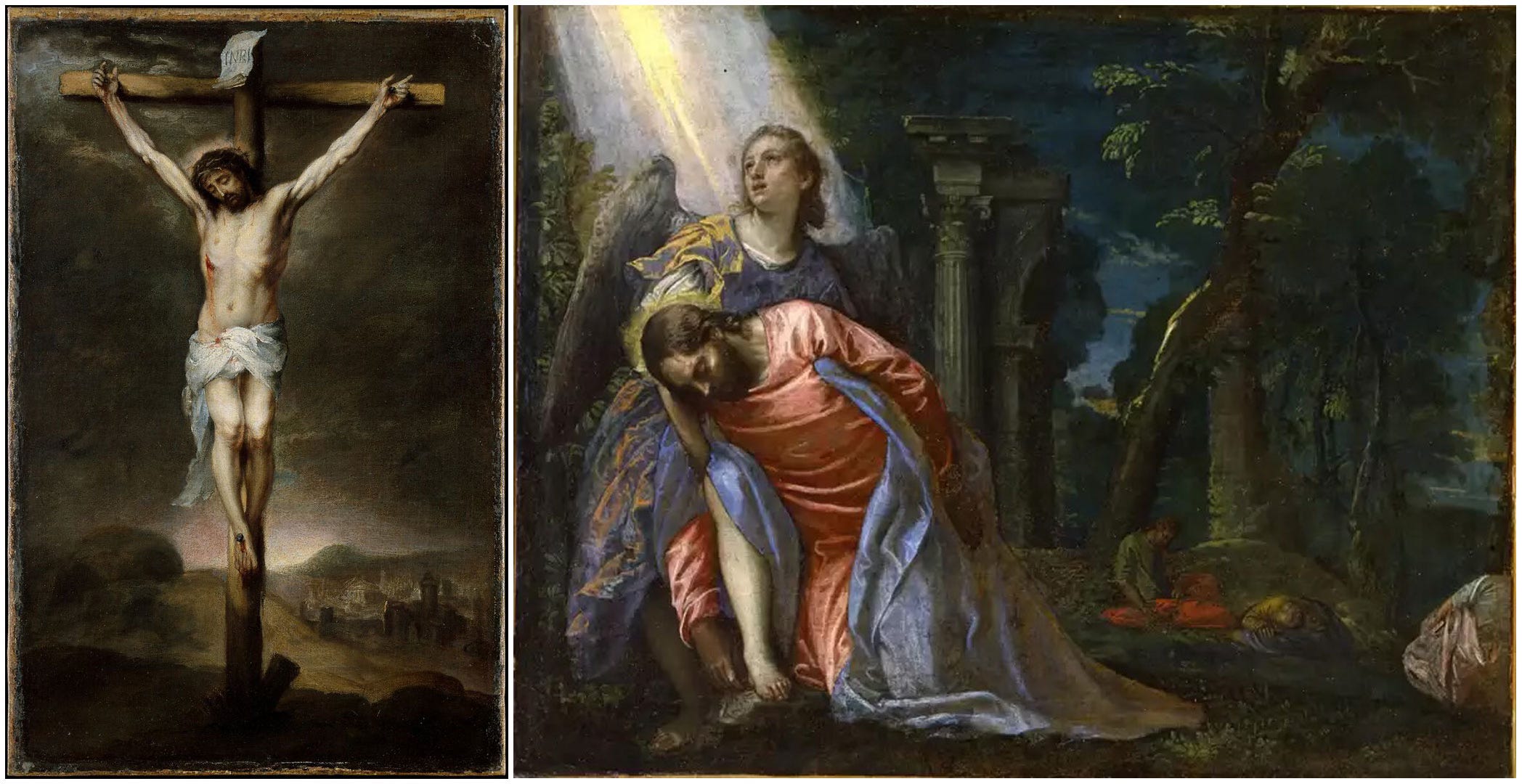PROMETHEUS, THE BOOK OF JOB AND THE PARADOX OF A LOVING GOD - Why Does God Let Us Suffer?
Smitten By Faith Issue Number : 0000101 27th June 2025
From time of humanity’s fall from grace in the Garden of Eden and Adam and Eve’s exile from Paradise, for the many thousands of years of our human existence, suffering, injustice, loss, pain and death are an existential part of our very being, transcending all cultures and societies.
In our modern world, we have an unending ‘list’ of man-made catastrophes such as the two world wars and pockets of seemingly continuous regional wars since then; senseless terrorist attacks and mass murders ; humanitarian and natural disasters - earthquakes, tsunamis, floods; pandemics, sickness, deaths; starvation, famine; millions of refugees; and airline and train crashes. The counts are gut-wrenching, the sufferings endless, and nowhere is any corner of the world spared.
Above : A kaleidoscope of suffering in our modern world.
There is pain, suffering and death. But, there is also endurance, resistance, hope and faith. Bad things will always continue to happen. The atheists will argue that there cannot be a God in the midst of so much human suffering. And yet for those of us who believe there is a God, we know that He accompanies us as we suffer the pain and endure the bad. He is even with us when like the biblical figure, Job, we rage at Him. God sees all this and yes, of course, He hears the indignation, anger and protestations hurled at Him. Is God still with us? So, today, I would like to examine the paradox of an ever loving God and why a God over flowing with love and mercy lets us suffer; allows the bad to happen; and why we can too can love God in the midst of all this.
Let us look at two icons of suffering and endurance – one ancient and the other biblical who exemplify this terrible state of human suffering. Let’s look at the Greek God Prometheus and the biblical Job, the very wealthy Jewish nobleman.
PROMETHEUS
Above : Sculpture of Prometheus by Nicolas-Sebastien Adam, 1762; The Louvre Museum, Paris.
In Greek Mythology, the God Zeus punishes the Titan Prometheus for stealing fire from the God Olympus. Zeus chains Prometheus to a remote mountain peak and then leaves him, all alone. There, Prometheus is forced to endure the torture of an eagle sent each day to devour and eat his liver - every day. As Prometheus is immortal, his liver grows back each night, providing a fresh meal, the next day, for the menacing eagle and fresh torture is again and again endlessly inflicted on the helpless Prometheus.
Although this very gory and dramatic Greek myth is ancient, the lessons on the nature of suffering which it provides is still very much relevant today. When Prometheus defied the God Zeus and stole the fire from Olympus, it was because he was astounded by the knowledge of how to make fire. When he stole this knowledge, his motivation was to acquire and share the knowledge. He was not to know that this selfless act was to have untold and horrific consequences. When Prometheus’ torture was repeated day after relentless day, we learn that the nature of suffering is repetitive; that it is not a single event; and that it is a continuous cycle. Worse, he was abandoned and left to suffer all alone. There seemed to be no salvation for Prometheus.
But wait – there is redemption and hope. This suffering however long, however relentless is not forever; it is not never-ending. It is not eternal. Finally Zeus allows Prometheus to be saved by Hercules or Heracles, another great figure in Greek mythology. Hercules is the hero and he has super-human strength. It is Hercules who then finally comes and kills the eagle. He breaks off the chains that bind Prometheus to the mountain and frees him at last. The torment and suffering is not to be eternal. There is redemption.
THE BOOK OF JOB
Above :The Sufferings of Job, oil on canvas by Silvestro Chiesa (1623-1657 ); Finnish National Gallery in Helsinki.
Fast forward to the Bible and we have the powerful story of the prosperous, upright, righteous Jewish nobleman from Uz called ‘Job’ whose love for God is undoubted. Many of us know the story of Job and his appalling afflictions and sufferings when he suddenly loses all of his possessions, wealth, health and then even his entire family. In fact, when one speaks of sufferings, the story of this enigmatic biblical figure is powerfully moving and poignant.
In the Book of Job, there seem to be two ‘Jobs’ existing side by side – the ‘Stoic Job’ and the ‘Raging Job’ – each one providing a different response to the horrendous sufferings imposed on this poor man. It is perhaps a good starting point for us to understand suffering in the context of God.
In Job 1:11–12, there is a conversation between Satan and God where Satan challenges Job’s righteousness suggesting that it is only due to the blessings which he has so far received from God. So, Satan wants to test Job by taking away all his possessions and his family and Satan says that, as a result, Job will surely curse God. God agrees to the test – with limits. Satan is not to kill Job.
‘Satan says, “But put forth thine hand now, and touch all that he hath, and he will curse thee to thy face.”
And the Lord said unto Satan, “Behold, all that he hath is in thy power; only upon himself put not thine hand”.
So Satan went forth from the presence of God.’
So, what happens next when Job loses everything. How do the two versions of the bereft Job react ?
In Job 3-42, we see the passionate and distraught Job. Far from resigned to his fate, this angry Job questions God about the unfairness of his suffering which piles on when he learns that his home has collapsed killing all members of his family beneath the rubble. He then rages and asks God to show cause for why this is happening to him. He exclaims, ‘God has wronged me. He has besieged me. I cry out, but get no response. I shout out, but can get no justice’ ( Job 19: 6-7).
However, in the same Book of Job, we also see a different response - that of the stoic passive Job. This version of Job is steadfast. In the face of all of his tragedies, he remains faithful to God with extraordinary saintly acceptance. This stoic Job does not blame God even when he asks, ‘Show me why You contend with me’ (Job 10:2). Job was clearly in pain and agony and now he was sharing this pain with his God – even though at this point in his life, he could not understand Him. When he learns that his home has collapsed, killing his whole family, Job responds with prayer and equanimity:
‘The Lord gives and the Lord takes away. Blessed is the name of the Lord’
(Job 1:21 )
So, which version of Job are we in the face of our sufferings ? Do we endure with passive acceptance or raging resistance ? We learn from the story of Job that life can be unfair and suffering happens to all - not just to the bad. It also hits the good. And, how we react really depends on each individual. There is no right or wrong response because we have a merciful and loving God.
At the end of the Biblical story we see a powerful conclusion to Job’s story in Job 42:16. God blesses Job with GOD’s faithfulness and God gives Job ‘twice what he had before.’ Job lived one hundred and forty years, seeing four generations of children and grandchildren. He died old and contented’. God did not only restore what Job had previously - he gave Job double what he had of everything. It’s a demonstration of God’s overwhelming restoration and love.
GOD AND LOVE
First. God does NOT cause suffering. We cannot know the answer to why there is so much suffering in the world; in fact, we may never know the answer. BUT, God does not make things difficult for us. Suffering is not a punishment for sin. In fact, the biblical Job was a very good man; totally blameless. Yet he loses everything. We cannot use conventional wisdom to understand the nature or profound mystery of suffering. Is God silent through all this? You can’t simply ‘dial God’ to answer your prayers when things are bad. Rage and lament ( just as Job did ) is understandable. But we can never understand suffering. But we can understand that God’s ultimate character is restoration and love. So, we are asked to first love God. We must trust Him and then we can be faithful to Him - even when we don’t understand. Instead of understanding suffering, we need to go beyond the mystery of suffering; expand our soul and see the message of hope when we love our infinite and omnipresent God.
ST JOHN OF THE CROSS 1542-1591
Above : Painting of St. John of the Cross by Francisco de Zurbaran, 1656; the Archdiocesan Museum in Katowice, Poland.
‘Nothing is obtained from God except by love.’
( St. John of the Cross )
St. John of the Cross OCD was a Spanish Roman Catholic Carmelite priest and a spiritual giant - one of the 37 Doctors - of the Church. A great mystic, his profound writings powerfully resonate through the centuries. In his insight into the divine love of God, St John of the Cross tells us that regardless of our birth or vocation, God desires a very special relationship of love, peace and joy with each one of us. God makes no distinctions and his love is accessible to all – even those who reject it. As St. John writes, ‘God is always the first lover, the perfect lover and source of all love’. This is the love that we are subject to. It precedes us and burns before us, ‘… an infinite fire of love . . . that surpasses all the fires of the world’. ( ‘Living Flame of Love’, 2.2).
St. John of the Cross writes that ‘when we are embraced by God, we begin to change a process which can sometimes be very painful. In his light, we see more clearly our vices, imperfections, and sins. The fire of God’s love wounds us, burning away our ego and pride, slowly changing us to become more like him. Though painful, the process is a kind of divine alchemy whereby the love of God we encounter divests us of all that impedes our call to total self-giving, so that eventually our whole existence becomes fused with God’s life. This is what divine love does—changing our love to become more perfectly like his.’
Faith transforms how we respond. For sure, suffering makes faith harder but not impossible and with love and trust in God – with faith, we will not be defeated by any suffering.
THE SUFFERINGS OF JESUS CHRIST
Right: Agony in the Garden of Gethsamane; Paolo Veronese circa 1583/1585; Pinacoteca di Brera, Milan.
Left : ‘The Crucified Christ’ oil on canvas by Bartolme Esteban Murillo (1617-1682) ; Metropolitan Museum of Art, New York City.
We all know how 2,000 years ago, Jesus Christ, the Son of God in his fully human form is tortured and ruthlessly crucified on the cross. So, if God lets His own son suffer and die so brutally on the cross, why would God make it easier for us than for Jesus ? We see here that perhaps we can find some of God's answer to our suffering – in that He came and suffered with us. Jesus Christ has fully identified with humanity and He has fully experience our pain and suffering. He has identified with us. If God is willing to suffer in this way for us, then surely we can trust Him ?
The crucifixion and the resurrection of Jesus Christ is God’s own direct response to suffering. Suffering is not eternal. Death too is not the end. Instead, all of humanity has the promise of eternal life and at the End of Days, when at the final judgement comes, Jesus Christ comes again,
‘…He will wipe every tear from their eyes. There will be no more death or mourning or crying or pain, for the old order of things has passed away’
(Rev. 21:4).
____________________________________________________________________________
Editor’s Note :
Dear Reader
Thank you for reading this edition of SMITTEN BY FAITH.
We publish once a month. ALL articles in every issue are FREE so you can simply click and subscribe as a FREE Subscriber to continuously receive the articles automatically by email.








